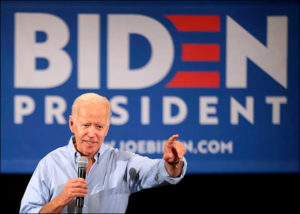By Jim Ellis
 Aug. 21, 2019 — The Pew Research Center conducted a national poll, of which many Democratic presidential primary questions were asked, but one was particularly interesting.
Aug. 21, 2019 — The Pew Research Center conducted a national poll, of which many Democratic presidential primary questions were asked, but one was particularly interesting.
The survey was taken from a universe of 5,766 panelists who agreed to respond to online Pew polls. For this study, conducted during the July 22 through August 4 period, 4,175 of those individuals did in fact respond, or 72.4 percent of those queried. From this respondent subset, 1,757 individuals who self-identified as Democrats or Democratic-leaning voters were questioned about the presidential primary.
The ballot test was not particularly noteworthy in that the results were mostly in line with other national polls being reported within the same time frame. According to Pew, former Vice President Joe Biden led the group, but with just a 26 percent preference score, followed by Sen. Elizabeth Warren (D-MA) at 16 percent, Sen. Bernie Sanders (I-VT) posting 12 percent, and Sen. Kamala Harris (D-CA) claiming 11 percent support. All others, including South Bend Mayor Pete Buttigieg polled in single digits.
But the most interesting question had to do with the individuals’ committed choices. The group was asked about their enthusiasm toward the candidates and whether they were attracted to only their stated choice or if other Democratic contenders also excited them. This question was asked to gauge strength of support.
The aggregate response showed that 35 percent were only enthused about their candidate of choice, while 63 percent said several of the candidates enthused them. Though he finished a rather distant third on the overall ballot test, it is Sen. Sanders who registers the most committed support.
A majority of the Sanders voters, 51 percent, responded that they are only enthused about his candidacy and feel the same about none of the other Democratic contenders. He is the only candidate to command a such a high committed support percentage.
Biden registered 45 percent who said they are only enthused for him, but 53 percent said others attracted their attention, as well. The candidate who had the least committed support, despite her defined rise in most national polls, was Sen. Warren. Only 19 percent of her voters say they are only committed to her, while 80 percent of her contingent are also enthused by other candidates. Sen. Harris scored slightly better, with 22 percent saying only she enthuses them, while 78 percent of her voters see other candidates they also like.




 March 22, 2019 — The CNN television network released their new national survey of the Democratic presidential contest (conducted by SSRS research company; March 14-17; 1,003 US adults, 456 self-identified Democrats and those Independents who lean to the Democratic Party, 448 self-identified Republicans and those Independents who lean to the Republican Party), and while the ballot test results were consistent with most other polling, some different and interesting questions were asked.
March 22, 2019 — The CNN television network released their new national survey of the Democratic presidential contest (conducted by SSRS research company; March 14-17; 1,003 US adults, 456 self-identified Democrats and those Independents who lean to the Democratic Party, 448 self-identified Republicans and those Independents who lean to the Republican Party), and while the ballot test results were consistent with most other polling, some different and interesting questions were asked.